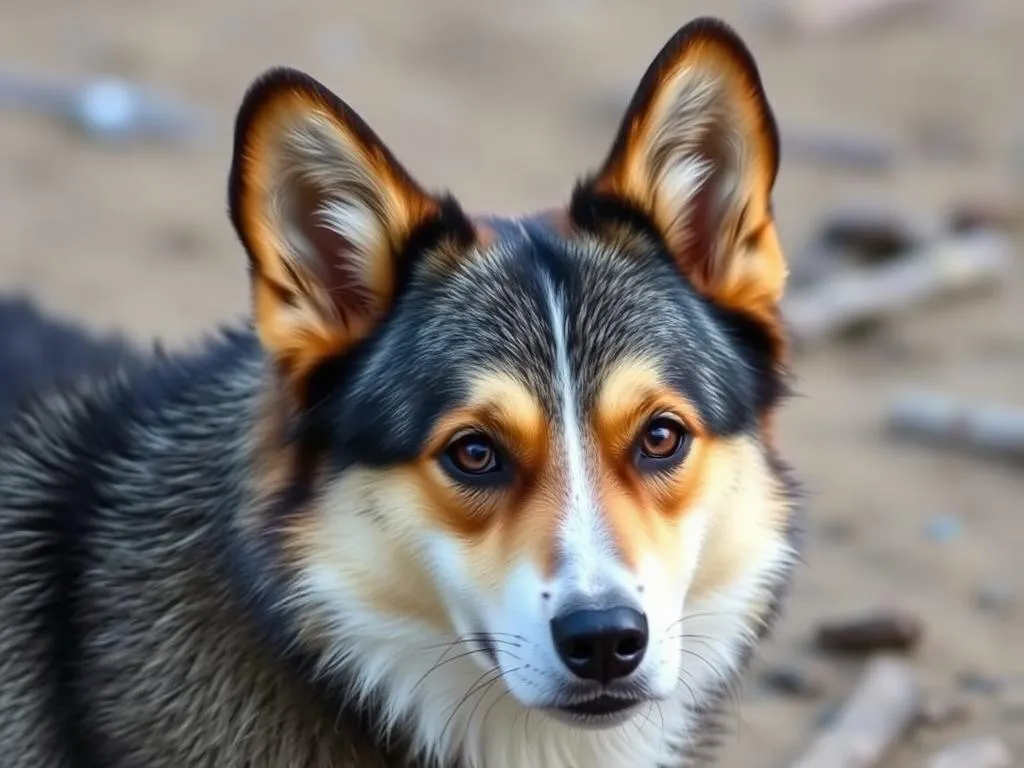
Introduction
In recent years, mixed dog breeds have gained immense popularity among dog enthusiasts and potential pet owners. One such intriguing mixed breed is the Wolf Corgi, a captivating blend of the Corgi and a wolf-like breed. As more people seek to understand different dog breeds, it becomes essential to explore the characteristics, behaviors, and care requirements associated with these unique combinations. This article will delve into the question, what is a wolf corgi, and provide insights into this fascinating breed.
Understanding Dog Breeds
Definition of Dog Breeds
Dog breeds are groups of domesticated dogs with specific characteristics, behavior patterns, and physical traits that distinguish them from other breeds. These traits have been honed over centuries, often for particular purposes such as herding, guarding, or companionship. The development of dog breeds can be traced back to ancient times when humans selectively bred dogs for specific tasks, resulting in the diverse array of breeds we see today.
Importance of Dog Breeds
Understanding dog breeds is crucial for prospective dog owners. Each breed has distinct temperament traits, energy levels, and care requirements that significantly influence the owner’s experience. For example, some breeds are more prone to certain health issues or require more exercise, while others may be more adaptable to apartment living. Knowledge of these factors helps owners choose a breed that aligns with their lifestyles.
Mixed Breeds vs. Pure Breeds
Mixed breeds, as the name suggests, are dogs that have parents from two or more different breeds. While purebred dogs are recognized by kennel clubs for their lineage and traits, mixed breeds often possess a combination of characteristics from their parent breeds.
Advantages and Disadvantages of Mixed Breeds
Advantages:
- Genetic Diversity: Mixed breeds may enjoy a wider genetic pool, potentially leading to fewer hereditary health issues.
- Unique Traits: The combination of different breeds can result in unique appearances and temperaments.
Disadvantages:
- Unpredictability: Mixed breeds may inherit traits from any of their parent breeds, making their behavior and appearance less predictable.
- Lack of Standardization: Unlike purebreds, mixed breeds may not have clear breed standards, complicating training and care.
What is a Wolf Corgi?
Definition and Origin
The Wolf Corgi is a delightful hybrid, typically resulting from the crossbreeding of a Corgi (either the Pembroke Welsh or the Cardigan Welsh) and a wolf-like breed, such as the Alaskan Malamute or Siberian Husky. This breed captures the playful and affectionate nature of Corgis while also showcasing some of the wild, majestic traits of its wolf ancestry.
Historically, Corgis were bred for herding and companionship, while wolf-like breeds were developed for their strength and endurance in harsh conditions. The combination of these two breeds creates a unique dog that possesses both a strong work ethic and a loving disposition.
Physical Characteristics
Wolf Corgis display a variety of physical traits influenced by both parent breeds. Generally, they are medium-sized dogs with a sturdy build and a short, stout stature, similar to their Corgi parent.
- Size: Typically, Wolf Corgis weigh between 25 to 50 pounds and stand about 10 to 15 inches tall at the shoulder.
- Coat Type: Their coats can range from short to medium-length, often thick and double-layered, providing insulation against cold weather.
- Color Variations: Common colors include fawn, black, brindle, and even gray or red, depending on the parent breeds.
Wolf Corgis may also exhibit distinct features such as erect ears, a bushy tail, and expressive eyes that reflect their wolf heritage.
Temperament and Behavior
The temperament of a Wolf Corgi can be quite fascinating. Generally, they inherit a blend of personality traits from both the Corgi and the wolf-like breeds.
- Common Traits: Wolf Corgis tend to be loyal, intelligent, and energetic, making them excellent companions. They are also known for their playful nature and love for human interaction.
- Comparison with Parent Breeds: While purebred Corgis are known for their friendliness and sociability, Wolf Corgis may exhibit a more reserved demeanor, particularly with strangers, due to their wolf ancestry. This can lead to protective instincts, making early socialization crucial.
Health Considerations
Common Health Issues
Like all breeds, Wolf Corgis can be susceptible to specific health problems, often inherited from their parent breeds. Some common health issues include:
- Hip Dysplasia: A common ailment in many dog breeds, this condition can lead to arthritis and mobility issues.
- Obesity: Due to their compact size and playful nature, Wolf Corgis may be prone to weight gain if not exercised adequately.
- Eye Problems: Conditions such as cataracts or progressive retinal atrophy are also seen in some Corgi and wolf-like breeds.
Lifespan
The average lifespan of a Wolf Corgi is typically around 12 to 15 years, depending on various factors such as genetics, diet, and overall care. Regular veterinary check-ups and a healthy lifestyle can significantly contribute to their longevity.
Regular Health Care
Regular health care is vital for maintaining a Wolf Corgi’s health. Key components include:
- Vet Check-ups: Routine vet visits for vaccinations and health assessments help catch potential issues early.
- Diet: A balanced diet rich in nutrients is essential. It’s advisable to consult a veterinarian for specific dietary recommendations suitable for Wolf Corgis.
- Exercise: Adequate exercise is crucial to prevent obesity and maintain mental stimulation.
Training and Socialization
Basic Training Techniques
Training a Wolf Corgi can be rewarding yet challenging due to their intelligence and independent nature. Effective training methods include:
- Consistency: Establishing a regular training schedule helps reinforce commands and behaviors.
- Positive Reinforcement: Rewarding good behavior with treats or praise encourages compliance and strengthens the bond between dog and owner.
Socialization Needs
Early socialization is essential for Wolf Corgis to develop into well-rounded pets. Exposing them to various environments, people, and other animals helps reduce fear and aggression.
- Recommended Activities: Puppy classes, playdates with other dogs, and trips to dog parks can significantly enhance social skills.
Common Behavioral Issues
While Wolf Corgis are generally well-behaved, some may exhibit behavioral problems, especially if not adequately trained or socialized. Common issues include:
- Barking: Due to their protective instincts, Wolf Corgis may bark excessively if not trained to be quiet.
- Separation Anxiety: Being social animals, they may develop anxiety when left alone for extended periods.
Addressing these issues early with proper training and socialization techniques is crucial for ensuring a balanced temperament.
Lifestyle Considerations
Ideal Living Environment
The living environment plays a significant role in the well-being of a Wolf Corgi. They thrive in homes where they receive ample attention and interaction.
- Urban vs. Rural Living: While Wolf Corgis can adapt to apartment living, they require daily exercise and mental stimulation. A rural setting with access to open spaces may be ideal, allowing them to explore and play freely.
Exercise Requirements
Wolf Corgis are energetic dogs that need regular physical activity to stay healthy and happy. Daily exercise needs typically include:
- Walks: At least 30 to 60 minutes of walking or jogging is essential.
- Playtime: Engaging in fetch or agility exercises can provide both physical and mental challenges.
Compatibility with Family Dynamics
Wolf Corgis can make excellent family pets, but their suitability depends on the family’s lifestyle.
- Families with Children: They can be good with children, especially if raised together, but supervision is necessary to prevent rough play.
- Interaction with Other Pets: Early socialization can help Wolf Corgis coexist peacefully with other pets, although their herding instincts may kick in.
Conclusion
The Wolf Corgi is a unique and captivating breed that embodies the playful spirit of Corgis while showcasing the strength and beauty of wolf-like breeds. Understanding their characteristics, health considerations, training needs, and lifestyle requirements is crucial for potential dog owners. By considering their lifestyle and the needs of a Wolf Corgi, prospective owners can ensure a happy and fulfilling companionship with this remarkable breed.
Frequently Asked Questions (FAQs)
What is the cost of a Wolf Corgi?
The cost of a Wolf Corgi can vary widely, typically ranging from $800 to $2,500, depending on factors like breeder reputation and geographical location.
How to find a reputable breeder?
To locate a responsible breeder, research online, attend dog shows, or consult breed clubs. Always ask for health clearances and visit the breeding facility if possible.
Can Wolf Corgis be trained easily?
Yes, with consistent training and positive reinforcement, Wolf Corgis can learn commands and behaviors. Their intelligence makes them capable learners, but their independent streak may require patience.
Are Wolf Corgis good family dogs?
Wolf Corgis can be excellent family dogs, especially when socialized from an early age. They are generally affectionate and protective, making them suitable companions for families.
What are the grooming needs of a Wolf Corgi?
Grooming needs for Wolf Corgis vary based on coat type but generally include regular brushing to manage shedding, especially during seasonal changes, and occasional baths to keep their coat healthy.









